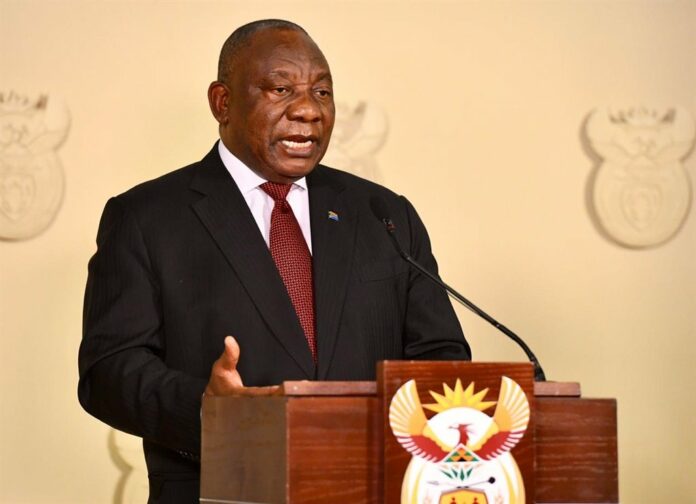President Cyril Ramaphosa. (GCIS)
President Ramaphosa’s speeches are being stuffed with Latinate abstracts and circumlocutions. Professor Ian Glenn asks if too many speech cooks are spoiling this broth.
How good or bad have President Ramaphosa’s speeches during the Covid-19 pandemic been? Most people liked his first speech and compared him and his response favourably to other speakers – whether to Jacob Zuma or foreign leaders like Donald Trump. Since then, his speeches have drawn more criticism, partly because people did not like what he was saying, but also because they have rhetorical flaws.
Let us start with the good points. Ramaphosa has remained dignified, has apologized for errors, and has held out olive branches to try to repair damage done by his colleagues. Communicating during a pandemic calls for honesty, reassurance and a sober tone and he has provided that.
But to whom is he speaking? Run the text of his speeches through the readability statistics in Word. His speech of May 26 needs 13 years of English language education for people to be able to understand it and his other speeches are as complex. It is un-democratic to speak to the country in most people’s second or third language and expect them to follow when one speaks like this. Nearly a quarter of the sentences are passive – another barrier to easy comprehension.
Should leaders speak like that? Compare the statistics of Ramaphosa’s speeches with the supposedly pretentious, Eton and Oxford-educated Boris Johnson speaking to an English-speaking audience. Run Johnson’s speech on a similar topic on May 10 on British television through the readability statistics and one finds it only needs 9 years of English language education and has only 8% passive sentences. Why is our second language English country using more complicated and convoluted English than the English?
Who stuffs Ramaphosa’s speeches with Latinate abstracts and circumlocutions? One of George Orwell’s six rules for writing good English was “Never use a foreign phrase, a scientific word, or a jargon word if you can think of an everyday English equivalent.” We should add ‘social scientific’ to that list and business speak and legalese. Do different members of the governing collective provide bits for the speech? The sociologist academic talks about ‘faith communities,’ the business-legal lot about ‘norms and standards’, the medics about ‘social distancing and hygiene measures’ and economists about complex financial schemes to save the economy. Are too many speech cooks spoiling this broth?
When you try to sound so formal and learned, you can make mistakes and sound pretentious. Towards the close of the May 26 speech, the original text published in the media read: “I therefore urge all South Africans to heed the call of the leaders of our various faith communities for a national day of prayer on Sunday, the 31st of May…” Why not simply “Let us all join in a day of prayer this Sunday.” (The major announcement of the speech was rhetorically in the wrong place, but that is another matter.) But then, in the actual speech, this was further embellished into: “I therefore urge all South Africans to heed the call of the leaders of our various faith communities for a national day of prayer which they have delineated as Sunday, the 31st of May…” Who made that last-minute addition of the incorrectly used ‘delineated’? (Did somebody confuse it with designated?)
Does the last-minute change suggest that the President is the speechwriter and the style is the man? Ramaphosa is a former head of his high school Student Christian movement who developed his considerable mastery of English over a lifetime as a shield and weapon, in a move from union representative arguing with English speaking mine owners to negotiator working on labour law and the new constitution and then to the boardrooms. Command of the formal English of management must have been a considerable advantage but the formal style of the pulpit and biblical phrasing or what works in the boardroom does not always translate into communicating effectively with the nation.
In an interview with SABC after the latest speech, Ramaphosa said: ‘We are going to migrate to another level. Those who are hankering for tobacco must know that it is only a matter of time before their hankering is assuaged or addressed.’ The rhetorical use of synonymia or double words (assuaged/addressed) for emphasis is typical of his speeches, occurring over 20 times in the speech of May 26. For critics, this is too often redundancy, for admirers, formal and dignified. The problem of the mixed biblical and business styles is that the addition of the bureaucratic cliche ‘addressed’ undermines the alliterative and quite witty phrase. So why not keep it simple: ‘We hope to move to level 2 soon when people will be able to buy cigarettes.’
If the President is indeed writing his own speeches, he should recall the adage that a lawyer who represents himself has a fool for a client. Writing – and presenting – speeches to inform, inspire and move the nation is more demanding than any law case and he should get better help.
– Ian Glenn is a Research Associate in Communications Sciences at the University of the Free State and Emeritus Professor of Media Studies at the University of Cape Town. He is working with Bob Mattes on a study of the South African government’s response to the Covid-19 pandemic for a Routledge Handbook comparing different national communications strategies.
